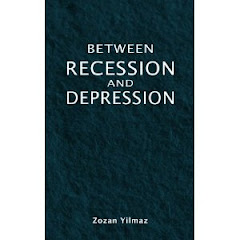There are four types:
1) Sovereign debt / defaults: When a government fails to meet payments on its external or domestic debt, obligations or both
2) Banking: After heavy investment losses, banking panics or both
3) Exchange rate: Over valuation etc.
4) Inflation: High or negative as with Japan
Only one of these is enough to bring crisis and there are all of it in current one.
Wednesday, 17 August 2011
Thursday, 11 August 2011
Risk Factors in APT
The good side of APT is that risk factors to be included are not limited to a certain number unlike CAPM.
You can include macro variables such as exchange rate, interest rate, industrial production, inflation or micro ones such as "equity risk premia" as named by The Economist.
You can include macro variables such as exchange rate, interest rate, industrial production, inflation or micro ones such as "equity risk premia" as named by The Economist.
Wednesday, 3 August 2011
If We Define Efficiency as Economic Units of GDP Funded by Lower Debt...
The Economist's breakdown of GDP/Debt percentage for countries between household and government units provides some brainstorming.
If We Define Efficiency as Economic Units of GDP Funded by Lower Debt...
Then households are very efficient in Japan lowering the whereas in Switzerland government is slightly more effient.
If We Define Efficiency as Economic Units of GDP Funded by Lower Debt...
Then households are very efficient in Japan lowering the whereas in Switzerland government is slightly more effient.
Friday, 22 July 2011
CAPM
A good point was made in FT's Short View today about risk free rate in CAPM.
When there is no risk free rate, APT is an alternative model to assess the return on risky assets.
When there is no risk free rate, APT is an alternative model to assess the return on risky assets.
Tuesday, 5 July 2011
Book of the Month in July: "Between Recession and Depression"
Better Business Focus magazine featured "Between Recesssion and Depression" as 'Book of the Month' for July 2011.
Thank you very much.
Thank you very much.
Wednesday, 29 June 2011
Can An Economy Succeed Without A Big Manufacturing Base?
The Economist's new survey thinks the answer is "no"
I think the closer an economy with protectionist measures such as tariffs, quotas the more likely it is the case
I think the closer an economy with protectionist measures such as tariffs, quotas the more likely it is the case
Friday, 24 June 2011
"50 big ideas": Capitalism
Capitalism is the 38th of ideas.
Evolving around three main thoughts of Classical Economists (mainly Adam Smith, David Ricardo, John Stuart Mill); Keynesians and monetarists during the last few centuries.
Evolving around three main thoughts of Classical Economists (mainly Adam Smith, David Ricardo, John Stuart Mill); Keynesians and monetarists during the last few centuries.
Thursday, 23 June 2011
"50 big ideas": Existentalism
Existentalism is the 13th of ideas in the book. I am reading the top paragraph, which makes me think whether this is be the case or the opposite. It says:
If anyone had asked me what existence was, I would have answered, in good faith, that it was nothing, simply an empty form which was added to external things without changing anything in their nature.
If anyone had asked me what existence was, I would have answered, in good faith, that it was nothing, simply an empty form which was added to external things without changing anything in their nature.
Saturday, 18 June 2011
Jane Austen
The best author I have read sofar is Jane Austen. Some of her books are so fluid that few hundred pages could be read in one day and the whole book finished in few days.
Friday, 17 June 2011
Global Growth - New Debate of The Economist
"Will global growth pick up in the second half of 2011?" is the new debate of The Economist.
This blogger doesn't see any such sign now and doesn't expect until 2012.
This blogger doesn't see any such sign now and doesn't expect until 2012.
Subscribe to:
Posts (Atom)


